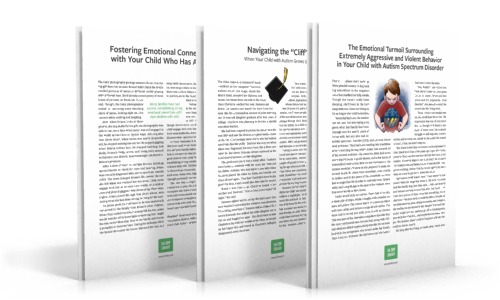Prader-Willi Syndrome: It’s Not Just the Number on the Scale
Written By: Alison Hennessee
Resource Creation By: Bridget Morton
Design By: Sunny DiMartino
In moments like these, Natalie* couldn’t help but see herself as a stranger might. She’d look down at herself from an imagined bird’s-eye view and wonder what someone who didn’t know her would think. Would the observer be puzzled, unable to tease out the complicated patterns her family created? Would they understand in an instant, see a story that laid itself out with aching clarity? Maybe they wouldn’t notice anything unusual at all. To this observer, Natalie would be just another overstretched mother, late thirties, strands of gray hair beginning to thread among the chestnut, sitting on the side of a bed with a Captain America comforter. Her son Jason huddled on the bed beside her, his mop of fair curls fanned out on the pillow, would be sobbing over a little league defeat or a bent bicycle frame or any one of the ordinary tragedies in a ten-year-old’s life.
Natalie had once allowed herself to entertain that sort of fantasy herself, but she rarely did anymore. Imagining some simpler version of her son’s struggles didn’t make it easier to soothe him or less daunting to pick up the pieces from another episode, so she tried to face their life as it was. Jason had Prader-Willi Syndrome, and lately, things had been difficult. He had been diagnosed relatively early, at age three, so Natalie and her husband Greg had had years to learn about the genetic disorder. By this point, managing Jason’s drive to overeat by controlling his environment was second nature, and she’d come to mostly understand the limitations that his mild intellectual disability placed on him.
His behavioral problems, however, were another story. In the last year, Jason’s behavior had gotten truly out of control. Most of the literature she’d read emphasized the weight issue with PWS, but these days, it was Jason’s outbursts, his rages, his rigid thinking, and his flat-out refusals to submit to anyone’s authority, that presented a bigger problem. If Natalie was honest with herself, these episodes were starting to tear her family apart.
Natalie rubbed her son’s back while his sobs subsided, murmuring soothing words as he went through the painful process of coming back to himself after a rage. At the same time, she kept an attentive ear for any sound coming from her daughter’s room. Samantha wouldn’t be sobbing; she’d long ago seemed to learn to tuck her sadness inward, a strategy she had perhaps developed in response to her brother’s explosiveness. But Natalie hoped she would hear something—the chirping of a video game or the clatter of colored pencils as Samantha dug through her box for the right shade—because silence meant that Samantha was still lost inside herself. Jason didn’t mean to harm anyone with his outbursts, least of all the sister he adored. Despite everything, the two were entwined with a special bond no other relationship could create. Jason could always make Samantha laugh, and often Samantha was the only one who could coax Jason out of one of his sit-down strikes. And Samantha, only eighteen months older than Jason, was smart and compassionate enough to know that Jason’s behavior was a result of his body striving toward a biological need. But Samantha was only human, and a child at that, and sometimes Natalie knew that her daughter couldn’t reason away the deep hurt.
Tonight had been a bad one. For almost a month, Samantha had been working on a leaf identification journal for her biology class. Before dinner this evening, Samantha had come into the kitchen beaming as she held out the finished product, due the next day, for Natalie to inspect. Natalie exclaimed over Samantha’s hard work and propped the book against the napkin holder so that Greg could admire it when he returned from a late shift at the hospital.

Then Natalie went upstairs to wake Jason for dinner. He’d had a physical therapy appointment that afternoon, and these sessions always exhausted him, so he’d been napping. Waking him was tricky. Some days he woke seeming refreshed and energized, eager to show Natalie all that he’d learned with his therapist. Other times, he was hard to rouse and when he did wake, he was sleep-hazed and truculent. On those occasions, Natalie knew they were all in for a difficult evening.
After finally wrangling Jason back into his clothes and coaxing him to the dinner table, Natalie set a plate of spaghetti and a bowl of salad in front of each of her children. She sat with them long enough to lead them in saying grace and to remind Samantha she had to eat at least three bites of salad. Then Natalie turned back to the stove to finish the grown-up version of the pasta she and Greg would eat when he got home. But as she reached into the spice cupboard, Natalie heard the tremulous beginnings of a wail. The muscles in her back tensed. She turned around to find that Jason, having already eaten all his food, was now staring at Samantha, who was laboriously twirling spaghetti around her fork.
“Sam got more noodles than me.” Jason’s chin was starting to quiver.
Natalie put on her most serene face and most soothing tone of voice. “No, sweetie, you got the same amount. Sam is just eating hers more slowly than you did; that’s why she still has some left.”
Jason banged a pudgy fist on the table, making the silverware rattle against the plates. “No! She got more!” He turned his face up to Natalie, and she saw it darkening with rage. “You need to give me exactly what she got! I want more noodles!”
“I’m sorry, honey, but that’s all for today. You got just the amount you need for right now.”
“You gave her more noodles because you love her more than me!” he shrieked, stabbing a finger at his sister. “You don’t love me!”
“Honey,” Natalie began, but Jason jumped out of his chair. He threw his silverware on the floor, sending the fork skittering across the tile, then flung his empty plate against a cupboard. Natalie reached for his arm, but he twisted out of her grasp. With a blur of motion, Jason made another grab for the tabletop, and before Natalie could even process what had happened, she heard a ripping sound and scraps of paper and dried leaves floated to the kitchen floor. There was a pause in which Natalie saw Samantha’s eyes widen with horror; then Samantha ran from the room. Natalie wanted to follow her, but she was trapped here; she couldn’t leave Jason alone. The door to Samantha’s room slammed.
It was all Natalie could do to keep Jason from hurting himself as he screamed and thrashed on the kitchen floor. After nearly an hour, she was able to lead him gently to his room, where he collapsed onto the bed, drained by his own fury. Gradually, Natalie felt his breathing slow and his muscles loosen. The furious red drained from his face, leaving him looking pale and exhausted. Natalie, taking another glimpse from the imagined bird’s-eye view, saw a woman and a boy who were both very, very tired.
Out of the silence, Jason finally said, “Did I ruin Sam’s book?”
Natalie swallowed hard and blinked away the stinging behind her eyes. She wished she had a different answer, but Jason already knew the truth.
“Yes, Jason. You did.”
Slowly, Jason slid off the bed and made his way unsteadily toward the door. Natalie followed him down the hall to Samantha’s room.
“Sam,” he said, knocking softly. “Sam, I’m sorry. I’m sorry I tore up your book.”
After a few minutes, Samantha opened the door. Her face was mottled red and white, her eyes puffy from tears. She gave Jason a small, sad smile.
“I know you are.”
When Natalie suggested that Jason go downstairs and work on the huge puzzle he’d been building for weeks, he agreed and walked away slowly, shoulders slumped. She walked with him, but instead of following Jason into the living room, she ducked into the kitchen. Besides the broken plate and scattered paper, there were leftovers that needed to be put away before Jason realized they were there. Then Natalie spent the next several hours helping Sam recreate her project. At least the night had ended peacefully, and for that she was grateful. But later, when the children were asleep and Natalie sat at the table sipping tea in the quiet , she wondered whether they would be as lucky the next time.
As a parent of a child with Prader-Willi Syndrome, you, too, may be experiencing challenges that go far beyond the number that appears when your child steps on the scale. Violent episodes at home, sit-down strikes at school, grocery-store meltdowns—these are all common behavioral problems those with PWS often exhibit. If your child is experiencing these issues, know that you’re not alone. Here’s what other parents have to say:
Carefully choose how you help your child understand his or her behavior. Make sure your child understands that while he or she may need to work on behavioral problems, they aren’t his fault; they are simply a function of having Prader-Willi syndrome. You might say something like “Everyone has strengths and challenges. Some of your challenges are due to the way your brain and body work, and if we work together, we can make those challenges easier to overcome.”
Understand your limitations. “The problem came when we would try to reason with her or try to keep her calm, because none of that works. There is no appeasing it . . . Things would escalate really easily. She would get very stubborn, and stubbornness is another sort of characteristic that people don’t talk about a lot of time with Prader-Willi. But if you try to go up against [my child with PWS] head to head, forget it—you are going to lose. I don’t care who you are; it’s just not the way to deal with these folks. What you try to do now, if you know it is coming, is you try to redirect her attention or you let her just go through it—you just keep her safe and calm.”
Yes, it is much harder than anyone imagines before they’ve been there. “It can go anywhere from a few minutes to hours where she is screaming and yelling and throwing things. Screaming bloody murder, using every swear word there is, hitting you, destroying property, whatever it takes. It’s really, really difficult.”
The number one way experts recommend for dealing with meltdowns is avoiding them. How do you do that? Create a structure and stick to it. To the best of your ability, try to keep your child with PWS on a regimented schedule. When things are different or unexpected, children with PWS tend to become anxious and uncomfortable. These feelings can easily boil over into shut-downs and outbursts. If your child knows when things will happen and what they will entail, he or she will be more likely to feel calm and secure, and thus less likely to have a behavioral episode.
Of course, life will inevitably get in the way of the best intentions to maintain consistency. There are no perfect schedules and no perfect parents, and even with the strictest of routines, your child will still have some bad days. But understanding and taking action to address the behavioral challenges that come with Prader-Willi Syndrome can go a long way toward real progress.
* Names have been changed to protect the privacy of the individuals interviewed for this story.

Sign Up to Receive New Posts
We promise not to spam you or share your information with anyone. And you can unsubscribe at any time . . . although we hope you stay a while!






